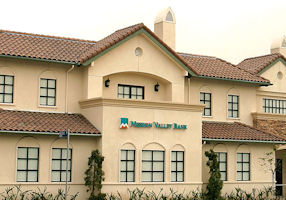Advocating for regulations tailored for the community banking industry will be the chief responsibility of Tamara Gurney as she takes on a year-long term as president of California Independent Bankers. Gurney, chief executive of Mission Valley Bank in Sun Valley, was selected as president of the organization on April 17. One week later she was on her way to Washington, D.C. to meet with members of Congress as a delegate of the Independent Community Bankers of America Policy Summit. Representing community banks is a passion of Gurney’s and now is the time to get regulations in place that match the work that smaller banks do, she said. “We have political capital in the work (ICBA President) Camden Fine has done and if we don’t capitalize on that, shame on us,” Gurney said. California Independent Bankers is an affiliate of the Independent Community Bankers of America. CIB has about 7,000 members statewide and represents more than 240 community banks within the state. Gurney has connections with the ICB going back about seven years, including serving on the executive committee. Mission Valley, which has branches in Valencia and Santa Clarita, is a small bank, reporting net income of just $1.2 million in the fourth quarter last year on assets of $242 million. Gurney has been with the bank since its founding in 2001. It is the one-size fits all of new federal banking regulations passed in response to the financial crisis that will have Gurney’s attention during her year as ICB president. For example, small banks must follow the same capital allocation rules to do mortgage lending as large national banks even though they may not have the money to do so. The ICBA wants to see a bifurcated system of rules for community banks. “It is not to escape regulations, it is to model it to the way we do business,” Gurney said. Venturing into Tech The information technology sector in the Los Angeles metro area drew the most funds from venture capitalists during the first quarter, according to accounting and consulting firm Ernst & Young. Venture capitalists put about $112 million toward IT, with more than half going to companies producing electronics and computer hardware, said Jeff Grabow, the west region venture capital leader in the San Jose office of Ernst & Young. That was up from $76 million in the fourth quarter of last year. “That bucked a national trend,” Grabow said. The Los Angeles area’s growing numbers of incubators and startups, which don’t need a lot of capital, are attractive to investors. Also, the local tech sector is heavy with companies making screens, batteries, packaging and exclusive apps for popular smart phones and computer tablets, he said. “Viewing something that is not native for an iPhone or iPad is not a lot of fun,” Grabow said. Overall in the Los Angeles area, there were 35 fourth-quarter deals and 30 in the first quarter. But while IT investment was strong, consumer services and health care were weak industry segments receiving venture capital in Los Angeles, he added. Banking Settlement First California Financial Group Inc., the Westlake Village-based parent of First California Bank, and PacWest Bancorp reached a settlement with plaintiffs in a class action lawsuit challenging the merger between First California and PacWest, according to a filing with the U.S. Securities and Exchange Commission. The two financial institutions agreed to make supplemental disclosures as part of the proxy statement about the deal. First California and PacWest, headquartered in Los Angeles, announced in November the merger valued at $231 million. The combined financial institutions under the PacWest name will become the eighth largest publicly held bank headquartered in California. The lawsuit on behalf of First California investors was filed in state Superior Court just weeks after the merger was announced. The lawsuit alleged the merger was the result of an unfair process at an unfair price and that First California board members breached their fiduciary responsibility by giving their approval. Among the supplemental disclosures was more background on the merger, including the rejections of three earlier proposals by PacWest said not to be in the best interests of First California shareholders; and a rejection of a reverse IPO proposal from a financial institution named “Company E” because it was viewed as less attractive. First California and PacWest reached the settlement on March 17. Board Chairwoman Non-profit lender Valley Economic Development Center named Pegi Matsuda as its new chair of the board of directors. Matsuda replaces Don St. Clair, the vice president of enrollment management and marketing at Woodbury University in Burbank. The VEDC assists small businesses in the Los Angeles region and other areas with direct loans, SBA loans, and microloans; consulting services; and entrepreneurial training programs. Matsuda has served on the VEDC board for 10 years. She is the senior vice president of community and market development for Valley Presbyterian Hospital. Prior to taking that position she had been publisher of the San Fernando Valley Business Journal. Staff Reporter Mark R. Madler can be reached at (818) 316-3126 or [email protected].
